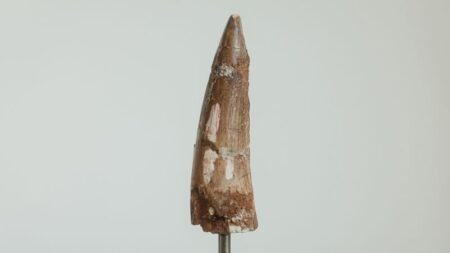The potential nomination of Jared Isaacman to lead NASA signifies a pivotal moment in the agency’s future direction, with a noteworthy focus on interplanetary exploration, namely Mars, set to take center stage at his confirmation hearing on Wednesday. Isaacman, also known as the CEO of Shift4 Payments, is no stranger to space travel, having personally invested in missions through SpaceX, making him a unique candidate for a role typically filled by seasoned scientists and engineers. His upcoming appearance before the Senate Committee on Commerce, Science, and Transportation will provide a platform for addressing concerns surrounding NASA’s evolving priorities under a Trump administration that has previously underscored lunar exploration initiatives.
The confirmation hearing is anticipated to spark extensive discussions on whether a transition toward Mars exploration implies an abandonment—or at least a reduction—of the ongoing Artemis program. This ambitious initiative aimed to return astronauts to the lunar surface has been a focal point of NASA’s operational strategies in the past few years, yet uncertainty looms over its continuation amidst shifting administrative goals. The Artemis missions, particularly the Artemis I flight that successfully orbited the Moon in 2022, represent not merely lunar ambitions but also a stepping stone toward deeper space endeavors.
Isaacman’s readiness to bolster Mars exploration is perceived as exciting yet controversial, especially as it contrasts sharply with sentiments from various political figures, including Senator Ted Cruz of Texas. Cruz has been vocal about maintaining a steadfast commitment to lunar exploration, warning that swift progress on the Moon is critical to counter China’s burgeoning space ambitions. He recently revealed that Isaacman has pledged to prioritize a human return to the Moon during the forthcoming presidential term—a commitment viewed by many as crucial to uphold American leadership in space.
Despite the rhetorical assurances to retain a focus on the Moon, Isaacman emphasizes that the journey to Mars must begin as well, declaring his intention to prioritize the mission of sending American astronauts to Mars. This approach indeed raises questions about balancing the dual aspirations of lunar and Martian exploration and how funding and contract allocations will be adjusted in response to potentially competing initiatives.
Furthermore, Isaacman’s selection has been met with skepticism regarding potential conflicts of interest, given his financial ties to SpaceX—an enterprise deeply intertwined with NASA contracts. His prior investment in several SpaceX-drived programs, along with potential governance over company milestones, underscores a perception that the lines between administrative goals and commercial interests may be increasingly blurred under his leadership.
In navigating changes, a critical matter will involve addressing budgetary allocations and potential staffing adjustments at NASA, concerns that have already begun to unsettle employees within the agency. The implications of budget cuts potentially reaching 50% raise alarms regarding the agency’s capability to conduct groundbreaking scientific research and address climate concerns, which have been core to NASA’s mission.
Historically, NASA has been at the forefront of scientific exploration that has significant impacts not just on the U.S., but globally, having properties that shine light on our understanding of the universe. Changes proposed or enacted under the Trump administration, particularly through the Department of Government Efficiency (DOGE), which has sought to streamline operations and reduce spending, have stirred considerable unrest among NASA staff worried about a budding culture of disconnection from critical science initiatives.
In his confirmation hearing, Isaacman is expected to articulate a vision that reinstates scientific exploration as a predominant priority. This includes potential new projects related to telescopes and exploratory probes that propel forward the current knowledge frontiers about both our planet and the cosmos.
Reflecting on his unique candidacy, Isaacman’s acknowledgment of his untraditional path to the NASA administrator position—including a lack of extensive scientific training—will be vital as he begins to navigate a landscape dotted with both opponents and allies. His prepared statement alludes to harnessing not just his own expertise but also leveraging the skills within NASA to engage more actively with its academic and commercial partners, thereby fortifying the agency’s capabilities for extraordinary future endeavors.
Ultimately, Isaacman’s historic potential confirmation comes with both lofty aspirations for the reinvigoration of NASA’s mission in space exploration and significant scrutiny regarding stakeholder interests. Whether he can effectively balance the priorities of Mars motivation while sustaining essential lunar operations remains a question of considerable importance in the ensuing months.












